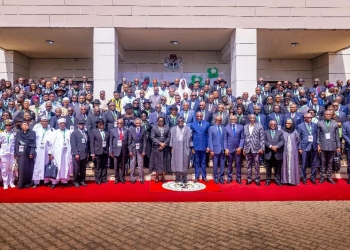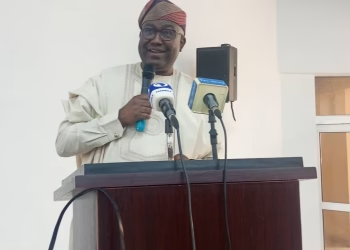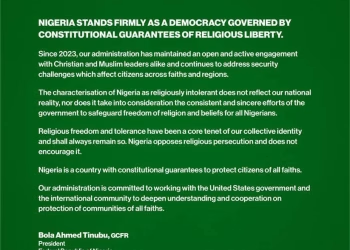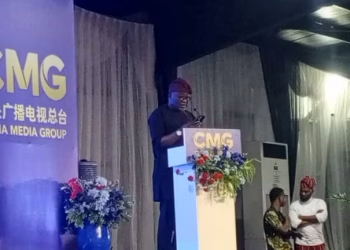By Simbo Olorunfemi
“What is soft is strong”
– Lao Tzu
If there was any doubt that the return of Donald Trump as the President of the United States of America would usher in another round of chaos in the international arena, unsettling allies and international institutions, provoking foes and neutrals, throwing up in the air laws, norms, and conventions that had been largely considered settled in international relations, that was gone within 24 hours of his inauguration as President. That would be affirmed by his words and actions over the past weekend in dealing with Colombia and sealed within the week with his confirmation that he would be slamming a 25% tariff on goods from America’s immediate neighbours and leading trade partners, Canada and Mexico, effective February 1st.
Unlike the first coming of President Trump, which largely caught the world by surprise, especially on the extent he was willing to trigger a drift away from the principles undergirding American foreign policy and an international order fashioned after its worldview, there ought not to be much of a surprise with Trump 2.0. If anything, it will deliver on what was promised and even much more, as the world appears incapacitated in containing an ideology whose objective is to upend much of what the world has taken for granted as principles governing international relations.
While Trumpism is defined more by its right-wing populism, conservatism and nationalism on the domestic front, it is an ideology that has at its core an isolationist and unilateralist approach to world affairs founded on the idea of American exceptionalism, reinforced by authoritarian tendency.
While some might consider Trumpism anachronistic in light of the shift in nature of the global political economy, which has led to a more complex and interdependent world with a multidimensional power configuration, President Trump’s worldview appears to have been framed by the darker interpretation of Nicolo Machiavelli’s advice to “The Prince” that, “it is better to be feared than to be loved if one cannot be both”. His politics and policy thrust appear to be driven more by the need to instil fear rather than be loved. Unmindful of power diffusion (horizontal and vertical) in the international system, and the transition from unipolarity to non-polarity, Trump sees the world as one in which America is the undisputed hegemon, whose word must be taken as law and not questioned, even if it stands in defiance of international law, norms, decency and logic.
That can be the only possible explanation for the decision by President Trump to start his second run by instigating trade wars with Canada and Mexico, America’s immediate neighbours whom he has generously hurled insults at, over the years. He has consistently accused them of being ‘’bad trade partners” who have not treated America right. His decision to levy blanket tariffs of 25 per cent on all goods entering the U.S. from Canada and Mexico has now gone into effect.
Finally, Canada is beginning to realise what Pierre Trudeau, former Prime Minister of the country and Father of the current Prime Minister, saw in 1969, when he said of the relations with the US, “Living next to you, is in some ways, like sleeping with an elephant. No matter how friendly and even-tempered is the beast, if I can call it that, one is affected by every twitch and grunt.” The twitch and grunt by Trump eventually pushed Trudeau Jr. over the cliff, forcing him to step down from the leadership of his ruling Liberal party and the country, even if he had been under pressure to do so for a while.
It is not as if there is no history to the trade battle between the US and Canada. There is a long list of grievances that had been held out by the US, especially concerning access to Canadian markets for all kinds of goods and services for many years. Trump is, however, not just about trade but border security. On trade, he is particularly irritated by Canada’s protectionist cover for its dairy, egg and poultry industries. But contrary to the complaint by President Trump that the “unfair” trade deficit with Canada is between $200 billion and $250 billion, the actual figure is not that huge, put at $ 61 billion for 2023, with US imports from Canada being $ 419 Billion and exports at $354 billion, with analysts say that much of the deficit was “caused by the U.S. importing Canadian oil, which keeps costs at the pump down for Americans.”
The case is similar to that of Mexico, America’s largest trading partner, with imports of $475 billion worth of goods for 2023 and exports of $323 billion. Beyond trade are the issues of immigration and border security which were at the core of his campaign. with President Trump criticising the country for not doing enough to stop the flow of migrants and drugs into the United States.
The tariffs on Mexican products are expected to lead to a rise in prices of SUVs and pickup trucks for consumers of major U.S. automakers with plants in Mexico, as well as electric machinery and a wide range of parts and equipment, and agricultural products and commodities like sugar, flour, meat and fresh fruit and vegetables, that does not happen to bother President Trump. Imports from Canada include crude oil, vehicles, petroleum gases; processed petroleum oils, and automobile parts and accessories. President Trump however made it clear, speaking recently at the World Economic Forum in Davos that he doesn’t “need Canadian cars, lumber or oil”.
The dispute with Canada and Mexico does not appear to take into consideration the existence of the United States-Mexico-Canada Agreement (USMCA) which was signed into law by President Trump on January 29, 2020, as a replacement for the North American Free Trade Agreement (NAFTA), and aimed to modernize trade relations between the United States, Mexico, and Canada. While some of Trump’s aides argue that tariffs are either being used as a “negotiating tool” or a “means of raising taxes on foreigners to pay for retaining low tax rates on Americans”, there is enough to suggest, from what we have seen, that there is more to it than that. Stephen Miran, a previous senior Trump adviser who has been nominated to chair his Council of Economic Advisers, in a paper touted to serve as a blueprint for Trump 2.0 anchors a proposal to reform the global trading system on the proviso “that access to the U.S. consumer market is a privilege that must be earned, not a right.”
How that idea will sit side by side with the provisions of the World Trade Organization (WTO) aimed at promoting fair competition, reducing trade barriers, and facilitating smooth and predictable international commerce is yet to be seen. WTO Director-General Ngozi Okonjo-Iweala has called for dialogue and restraint among members in response to the Trump phenomenon. Drawing parallels to the 1930s Smoot-Hawley Act, Okonjo-Iweala warns that retaliatory trade wars could have catastrophic consequences for global growth.
Trumpism, with unilateralism at its core, obviously sees things differently. Giulio Gallarotti argues that unilateralism “can be especially debilitating, because in an interdependent and globalized world, unilateral solutions to international problems are often inferior to collective solutions”. He submits that “…forsaking erstwhile allies and international commitments in favour of unilateral solutions produces a maverick image that compromises traditional sources of power embedded in multilateral support networks. Without such networks, even preponderant national resources will fall short of the effectiveness of multilateral solutions in attending to foreign objectives, thus creating an unsupportable burden for the maverick nation.”
But this is a moment of triumphalism for Trumpism. It is riding high on the belief that its ideology and policies Trump are superior and will ultimately prevail. That comes with a mindset that manifests in a lack of humility and a heightened sense of pride and confidence in the agenda that has been adopted, with the tendency to be dismissive of other viewpoints, making dialogue and compromise unwelcome.
Whether in arbitrarily renaming the “Gulf of Mexico” as the “Gulf of America”, or expressing a renewed interest in acquiring Greenland, an autonomous territory of Denmark, and even suggesting the possibility of using military force, if necessary, it is President Trump, playing being deliberately and unapologetically provocative, playing from the old notebook. Whether in announcing the withdrawal of the United States from the World Health Organization (WHO), an organisation for which it contributes about 18% of its overall funding, or in announcing a 90-day freeze on almost all U.S. foreign aid, it is on account of the same worldview, which sees everything as transactional. “World Health ripped us off, everybody rips off the United States. It’s not going to happen anymore,” Trump says. Lawrence Gostin, a professor of global health at Georgetown University, says, “This is the darkest day for global health I have ever experienced…Trump could be sowing the seeds for the next pandemic”.
Well, how this might undermine the state of health across the globe, and even “leave the U.S. more vulnerable to health threats”, is secondary, if it is any consideration.
Whether in threatening to retake the Panama Canal, alleging unfair treatment of American ships, and Chinese influence there, threatening Colombia with tariffs and visa sanctions for initially refusing to accept deportation flights from the United States with military planes, or issuing threats to impose 100% tariffs on exports from BRICS nations (Brazil, Russia, India, China, and South Africa), to the United States if they attempt to replace the U.S. dollar as the dominant currency in international trade, it is all about an impetuousness couched as a common-sense. The objective of President Trump is to instil fear, which he sees as the only means through which he and America can earn respect. The “victory” in the standoff with Colombia, was celebrated by the ‘White House’ as evidence that the US is “respected again”.
It is a philosophy that refuses to accept the fact that in an increasingly interdependent world in which what happens in one part of the globe can have a reverberating effect in another part in only a short while, it is antithetical to the preservation of self-interest to adopt a unilateralist and belligerent posture, no matter how powerful such a nation might assume itself to be.
It is a statement to the interconnected nature of the current international system that while the ‘White House’ was patting itself on the back over the spat with Colombia that the US is being “respected again”, the country was jolted by DeepSeek, a ‘Chinese’ Start-up that ‘no-one’ had heard of only a few days before then with its release of an AI model, DeepSeek-R1, which challenged the dominance of U.S. tech giants like Google and OpenAI with its cost efficiency, deploying fewer and less advanced chips, spending less than $6 million in comparison with the multi-billion dollar budgets by American Tech giants, thus triggering a fall in the NASDAQ index by 3%, losing 612 points in a day, with Nvidia taking a massive hit, dropping by 17% with a reduction in market value by $589 billion, being the largest single-day loss for any company in stock market history.
This development, described as an “AI Sputnik moment,” has cast a huge doubt on the whole A1 ecosystem, which the US had assumed itself to be in the lead, prompting US policymakers to reconsider their strategies and investments in AI to maintain competitiveness, with President Trump describing it as “…a wake-up call for our industries that we need to be laser-focused on competing”. To House Speaker, Mike Johnson DeepSeek is “a serious threat” from China, which is a “terrible trading partner.” “They abuse the system. They steal our intellectual property. They’re now trying to get a leg up on us on AI, as you’ve seen the last day or so… It’s a serious threat to us and to our economy and our security in every way.” It would emerge within the week that there are several other Chinese AI start-ups, apart from DeepSeek that are either at par or even working on more powerful models in some areas, confirming that China is making significant strides in AI.
If there was any evidence that there are other dimensions to earn respect other than by issuing threats and slamming tariffs on those who we disagree with, that was it. As Joseph Nye Jr. explains, “…in a world where borders are becoming more porous than ever to everything from drugs to infectious diseases to terrorism, nations must mobilize international coalitions and build institutions to address shared threats and challenges. In this sense, power becomes a positive-sum game. It is not enough to think in terms of power over others. We must also think in terms of power to accomplish goals that involves power with others. On many transnational issues, empowering others can help us to accomplish our own goals. In this world, networks and connectedness become an important source of relevant power”.
Smart countries are adopting more of charm than intimidation in their foreign policy toolbox. As captured in a placard by one Australian Senator, “…if you respect the world’s laws, the world will respect you.” At this time, our interconnectedness as a people is beyond dispute, with greater ease of communication and travel making it easier for diseases to move from one extreme part of the world to another, within hours. We live at a time when the multidimensional nature of international relations is now more obvious, with non-state actors (Elon Musk?) wielding as much influence, if not more, and even power, as state actors. The world had been flattened by the internet. No country can do it by itself, no matter how large or powerful it is. So much for Trumpism and its triumphalism.
***Simbo Olorunfemi, a Specialist on Nigeria’s Foreign Policy and Managing Editor of Africa Enterprise, works for Hoofbeatdotcom, a Nigerian communications consultancy. Email: Editor@enterpriseafrica.ng











